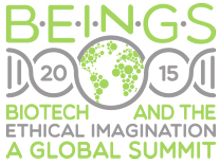
Biotechnology and the Ethical Imagination:
A Global Summit
May 17-19
The Tabernacle, Atlanta
Thirty countries, 200 delegates, 1,000 participants, one set of ethical standards. These numbers highlight the content and goals of the upcoming BEINGS 2015 Summit on May 17-19 at the Tabernacle in downtown Atlanta.
BEINGS (which stands for Biotechnology and the Ethical Imagination: A Global Summit) is a gathering of the world's thought leaders to discuss highly debated issues of stem cell research, synthetic biology, and other human cellular biotechnologies. Hundreds of experts in science and ethics will work together to establish a vision and consensus on ethical guidelines and policy standards for research and development in this area.
According to summit founder Paul Root Wolpe, director of the Emory Center for Ethics, this assembly is needed because advances in biotechnology are moving at a dizzying pace, with profound implications, both good and bad, for the future of humanity. (Think regrowth of missing limbs, design of hybrid animals, engineered bacteria.)
"No international consensus exists on how we should think about, direct or limit our biotechnological efforts," says Wolpe, who also serves as NASA's senior bioethicist and as editor-in-chief of the American Journal of Bioethics Neuroscience.
Moreover, he says, the current regulatory environment for cellular biotech is bad for business, academic research and the public: "Laws differ from state to state and nation to nation. A researcher might be allowed to carry out a cellular experiment in California but prohibited from doing that same research in Georgia. In Europe, members of the European Union have very different rules on biotechnology. Germany's laws are very strict, partly in response to concerns about their history during WWII, while the UK's are very liberal. This leads to regulatory chaos related to R&D, costing businesses millions in revenue and even more to the public in lost opportunity."
At the summit, a distinguished group of speakers will help frame the issues, and delegates (scientists, policy-makers, ethicists, business leaders, NGO leaders, and creative thinkers from philosophy, religion, art, and the humanities) from the top 30 biotech-producing countries of the world will help draft the consensus document, and more than 800 visitors/observers will be able to offer input. In addition to Emory and 14 other Georgia-based partner universities, a host of hometown sponsors, including Coca-Cola, the Marcus Foundation, and the Georgia Research Alliance, are helping fund the event.
"If we are successful," says Wolpe, "we will have a new set of standards that can help shape the direction of global biotechnological advancement for years to come. With a common playbook, the biotech industry can move beyond the regulatory chaos and streamline research in ways that will ultimately benefit all of us. Register for BEINGS 2015.
